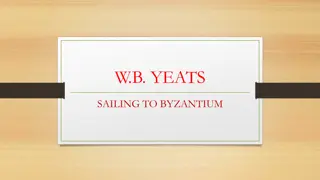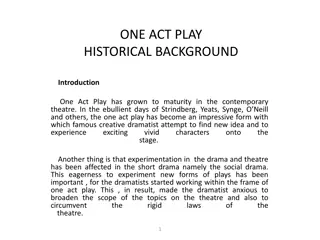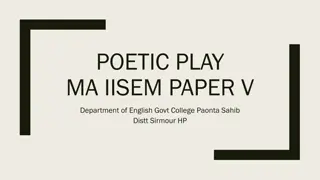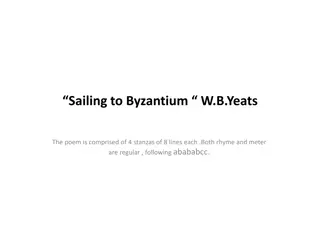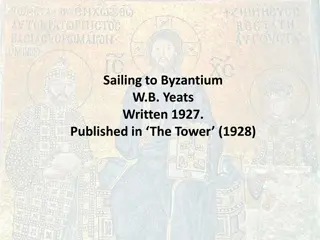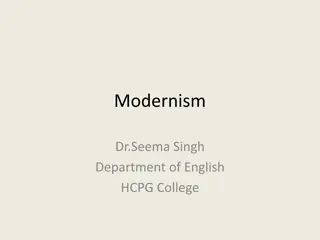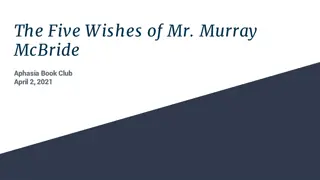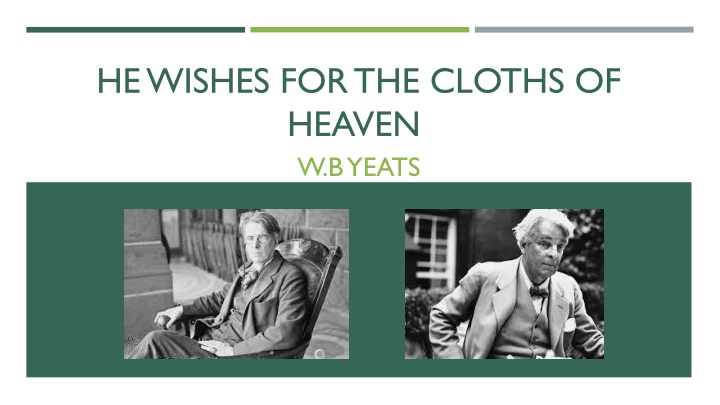
Cloths of Heaven - W.B. Yeats and His Poem for Maud Gonne
Discover the relationship between W.B. Yeats and Maud Gonne, the inspiration behind his famous poem "He Wishes for the Cloths of Heaven," exploring his life, love, and poetic creations. Learn about Yeats' legacy as a prominent Irish poet and his enduring impact on literature.
Download Presentation

Please find below an Image/Link to download the presentation.
The content on the website is provided AS IS for your information and personal use only. It may not be sold, licensed, or shared on other websites without obtaining consent from the author. If you encounter any issues during the download, it is possible that the publisher has removed the file from their server.
You are allowed to download the files provided on this website for personal or commercial use, subject to the condition that they are used lawfully. All files are the property of their respective owners.
The content on the website is provided AS IS for your information and personal use only. It may not be sold, licensed, or shared on other websites without obtaining consent from the author.
E N D
Presentation Transcript
HE WISHES FOR THE CLOTHS OF HEAVEN W.B YEATS
WILLIAM BUTLER YEATS William Butler Yeats(13 June 1865 28 January 1939) was Irish poet, dramatist, writer and one of the foremost figures of 20thcentury literature. A pillar of the Irish literary establishment, he helped to found the Abbey Theatre, and in his later years served two terms as a Senator of the Irish Free State William Butler Yeats is widely considered to be one of the greatest poets of the 20th century.
WILLIAM BUTLER YEATS Yeats met Maud Gonne in 1889, a tall, beautiful, socially prominent young woman Yeats began an obsessive infatuation, and she had a significant and lasting effect on his poetry and his life thereafter. In 1891 he visited Gonne in Ireland and proposed marriage, but was rejected. Yeats proposed to Gonne three more times: in 1899, 1900 and 1901. She refused each proposal, and in 1903, she married major John MacBride
WILLIAM BUTLER YEATS Yeats was married to George Hyde-Lees in 1917, with whom he had two children: Anne Butler Yeats (1919) and William Michael Yeats (1921). In 1922, Yeats accepted an invitation to be a member of the new Irish Senate, where he served for six years. He was awarded the Nobel Prize for Literature in 1923. Yeats continued to write until his death. He died on January 28, 1939 in France
He Wishes for the Cloths of Heaven is a poem Yeats wrote for Maud Gonne, a woman he loved for most of his life although she did not return his feelings. It is a relatively simple poem but it contains a few surprises and uncertainties. HE WISHES FOR THE CLOTHS OF HEAVEN The colours and patterns are the images created by nature in the different seasons and different times of day and night. The main message of this poem is that wanting to give gifts to someone you love, but having only the greatest gift of all, your dreams, to give is heartbreaking because they are so delicate
HE WISHES FOR THE CLOTHS OF HEAVEN The phrase cloths of heaven is sometimes taken refer to the kind of cloths one might imagine being seen in Heaven, but it s far more likely that Yeats uses the word heavens to mean the sky and the natural world around us. If the poet had such cloths, even though they would be so precious, he would place them under the feet of the woman he loves because of his devotion to her. The speaker, addressing his love or would-be love, says: if I were a rich man, I d give you the world and all its treasures. for you.
HE WISHES FOR THE CLOTHS OF HEAVEN But he states that he is only a poor man, and obviously the idea of making the sky into a blanket is silly and out of the question,so all he has that is worth anything is his dreams. Dreams are delicate and vulnerable hence the use of the phrase Tread softly .

![READ⚡[PDF]✔ Yup I'm Dead...Now What? The Deluxe Edition: A Guide to My Life Info](/thumb/20463/read-pdf-yup-i-m-dead-now-what-the-deluxe-edition-a-guide-to-my-life-info.jpg)

